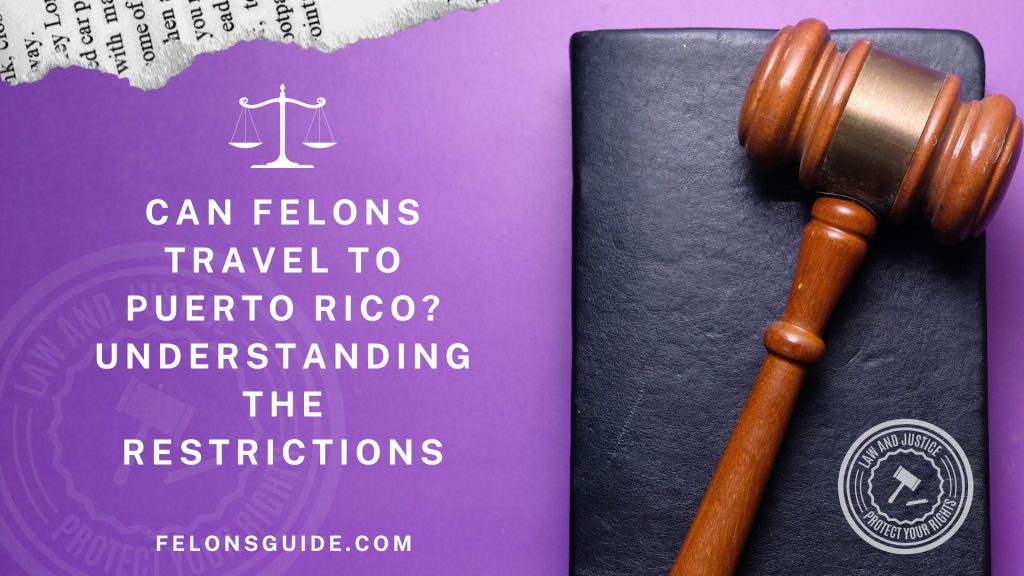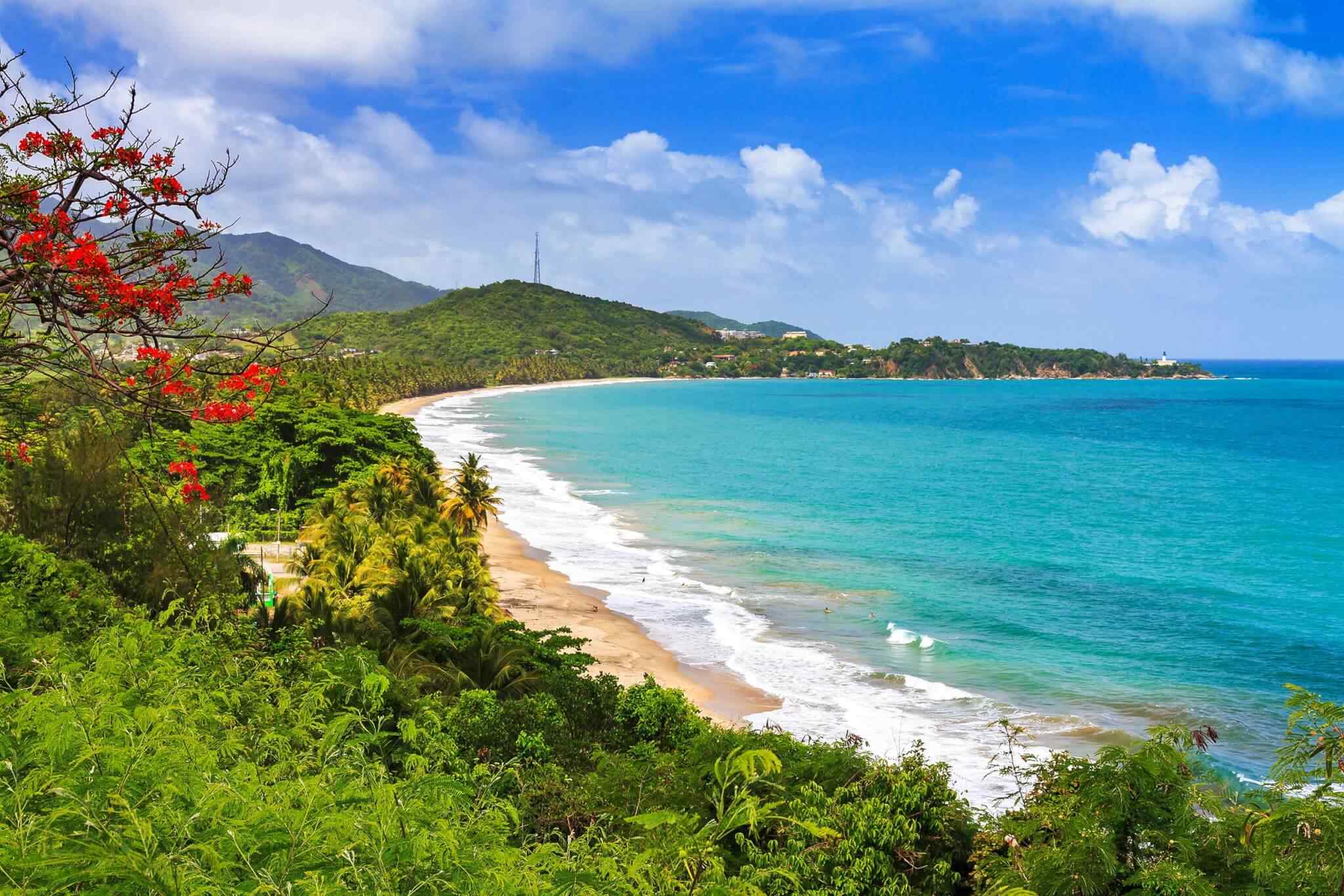Traveling to Puerto Rico is a dream for many, but felons often find themselves questioning whether they can partake in this adventure. If you're a felon wondering if Puerto Rico is within reach, you're not alone. The legal complexities surrounding felons traveling internationally can be daunting, but Puerto Rico has its own set of rules. In this article, we'll delve into the specifics of traveling to this enchanting destination, addressing questions and concerns that felons might have. Understanding the legal framework, visa requirements, and potential restrictions can make your journey smoother and more enjoyable.
As a U.S. territory, Puerto Rico operates under certain federal regulations but maintains its unique identity. This means that while some aspects of traveling there may seem straightforward, others could present challenges for felons. For instance, if you have a criminal record, you might worry about background checks or additional scrutiny at customs. This article aims to clarify these issues and provide actionable advice so that you can plan your trip with confidence.
Our goal is to equip you with the knowledge needed to navigate the process of visiting Puerto Rico as a felon. Whether you're planning a vacation, a family reunion, or a business trip, understanding the rules and regulations will help ensure a stress-free experience. We'll cover everything from entry requirements to potential challenges, offering tips and insights to guide you along the way. Let's explore the possibilities and dispel common misconceptions about felons traveling to Puerto Rico.
Read also:What Is Medusa Piercing A Complete Guide To The Trendy Facial Jewelry
Can Felons Travel to Puerto Rico?
One of the first questions that arises when discussing this topic is whether felons are allowed to travel to Puerto Rico. The good news is that, as a U.S. territory, Puerto Rico does not require a passport for U.S. citizens. This simplifies the process for felons who might face restrictions when traveling internationally. However, it's essential to consider any outstanding warrants or legal issues that could affect your ability to travel.
While the absence of passport requirements may seem like a green light, felons should still exercise caution. If you have a criminal record, customs officials may conduct additional checks upon arrival. To avoid complications, ensure that your legal matters are resolved and up-to-date. This proactive approach can help you enjoy your trip without unnecessary stress.
What Are the Entry Requirements for Felons Traveling to Puerto Rico?
Understanding the entry requirements is crucial for any traveler, especially felons. Since Puerto Rico is part of the United States, U.S. citizens, including felons, do not need a passport to visit. Instead, a government-issued ID, such as a driver's license, is sufficient. However, if you're flying from an international location, you'll need a valid passport, regardless of your criminal history.
It's worth noting that while there are no specific restrictions on felons traveling to Puerto Rico, certain offenses could raise red flags. For example, drug-related convictions might attract additional attention at customs. If you fall into this category, it's advisable to consult with a legal expert before making travel arrangements. Being informed and prepared can help you avoid unexpected hurdles.
Can Felons Travel to Puerto Rico Without a Passport?
As mentioned earlier, U.S. citizens, including felons, do not need a passport to travel to Puerto Rico. This is one of the key advantages of visiting a U.S. territory. However, if you're coming from outside the United States, a passport is mandatory. Felons with a history of international travel should ensure their passport is valid and up-to-date, as it will be required for re-entry into the U.S.
For those traveling by sea or land within the United States, a passport is not required. This makes Puerto Rico an accessible destination for felons who may face restrictions on international travel. Nevertheless, it's always wise to carry proper identification to avoid any misunderstandings during your journey.
Read also:Did Barry Manilow Sing On Agt Exploring The Connection Between Barry Manilow And Americas Got Talent
What Challenges Might Felons Face When Traveling to Puerto Rico?
While the process of traveling to Puerto Rico is generally straightforward, felons might encounter certain challenges. These could include heightened scrutiny at customs, potential delays, or even denial of entry in extreme cases. To minimize these risks, it's important to address any outstanding legal issues before your trip.
- Ensure all legal matters are resolved.
- Carry proper identification and travel documents.
- Be prepared to answer questions about your criminal record.
Can Felons Travel to Puerto Rico and Enjoy a Stress-Free Vacation?
Absolute peace of mind may be difficult to achieve, but with proper planning, felons can enjoy a stress-free vacation in Puerto Rico. The key is to prepare in advance and understand the potential challenges. By addressing any legal concerns and familiarizing yourself with the entry requirements, you can focus on enjoying the island's vibrant culture and stunning landscapes.
Puerto Rico offers a wealth of attractions, from its historic Old San Juan district to its pristine beaches and lush rainforests. Whether you're exploring the El Yunque National Forest or savoring local cuisine, the island has something for everyone. As a felon, you can still experience the beauty and charm of Puerto Rico by taking the necessary precautions.
Can Felons Travel to Puerto Rico and Experience Local Culture?
Absolutely! Puerto Rico is renowned for its rich cultural heritage, and felons are no exception when it comes to experiencing it. From vibrant festivals to world-class museums, the island offers countless opportunities to immerse yourself in its unique traditions. Attending a salsa dance class or visiting the San Juan Bautista Cathedral can provide unforgettable memories.
It's important to remember that while enjoying the local culture, you should also respect the laws and customs of the island. This includes adhering to any rules related to your criminal record. By doing so, you can fully appreciate the beauty of Puerto Rico without compromising your safety or legal standing.
What Are the Legal Implications for Felons Traveling to Puerto Rico?
Understanding the legal implications is essential for felons planning to visit Puerto Rico. While the island's status as a U.S. territory simplifies the travel process, certain legal considerations must be taken into account. For instance, if you have a felony conviction related to drugs or violent crimes, you might face additional scrutiny upon arrival.
It's also important to note that Puerto Rico has its own judicial system, which operates independently of the mainland United States. This means that local laws and regulations may differ slightly, so staying informed is crucial. Consulting with a legal professional can provide clarity and peace of mind before your trip.
How Can Felons Prepare for Travel to Puerto Rico?
Preparation is key when it comes to traveling as a felon. Start by reviewing your criminal record and resolving any outstanding legal issues. Next, gather all necessary travel documents, including a government-issued ID or passport if required. Familiarize yourself with the entry requirements and any potential restrictions related to your conviction.
Additionally, consider creating a detailed travel itinerary and sharing it with a trusted friend or family member. This ensures that someone knows your whereabouts in case of an emergency. Packing essential items, such as medication and legal documentation, can also help make your trip smoother and more enjoyable.
Can Felons Travel to Puerto Rico and Stay Updated on Local Laws?
Yes, staying informed about local laws is vital for felons visiting Puerto Rico. While the island shares many legal similarities with the mainland United States, there are nuances that could affect your trip. For example, certain firearms regulations or drug laws might differ, so it's important to stay up-to-date on these matters.
One effective way to stay informed is to consult with a local attorney or legal expert. They can provide guidance on any specific concerns related to your criminal record. Additionally, keeping an eye on official government websites or travel advisories can help you stay abreast of any changes or updates.
Conclusion: Can Felons Travel to Puerto Rico and Enjoy a Memorable Experience?
In conclusion, felons can travel to Puerto Rico and enjoy a memorable experience with proper preparation and planning. By understanding the entry requirements, addressing legal concerns, and respecting local laws, you can create a stress-free vacation in this beautiful destination. Puerto Rico offers a wealth of attractions and cultural experiences that are accessible to all, regardless of criminal history.
Remember to stay informed, carry proper identification, and resolve any outstanding legal issues before your trip. With these steps in mind, you can embark on a journey to Puerto Rico that is both enjoyable and enriching. Whether you're exploring its historic sites or relaxing on its breathtaking beaches, the island awaits to welcome you with open arms.
Table of Contents
- Can Felons Travel to Puerto Rico?
- What Are the Entry Requirements for Felons Traveling to Puerto Rico?
- Can Felons Travel to Puerto Rico Without a Passport?
- What Challenges Might Felons Face When Traveling to Puerto Rico?
- Can Felons Travel to Puerto Rico and Enjoy a Stress-Free Vacation?
- Can Felons Travel to Puerto Rico and Experience Local Culture?
- What Are the Legal Implications for Felons Traveling to Puerto Rico?
- How Can Felons Prepare for Travel to Puerto Rico?
- Can Felons Travel to Puerto Rico and Stay Updated on Local Laws?
- Conclusion: Can Felons Travel to Puerto Rico and Enjoy a Memorable Experience?


